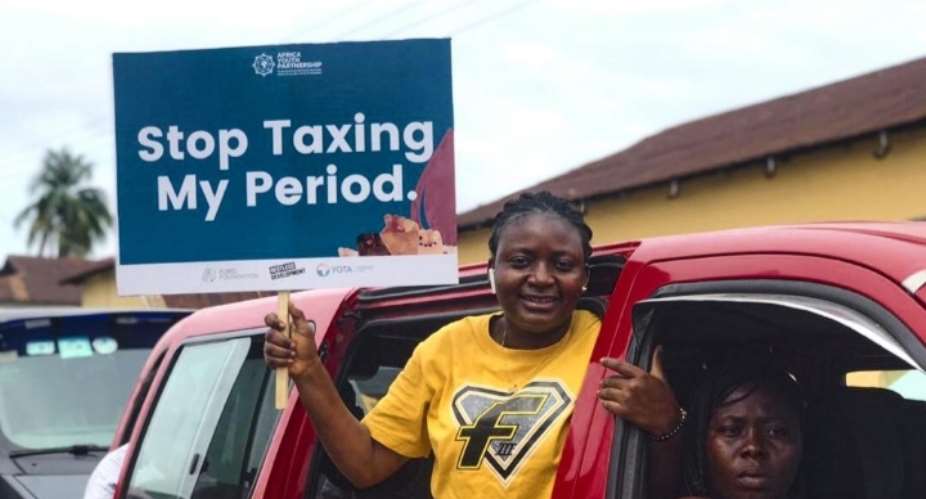The Africa Youth Partnership, a collaborative initiative by Youth Opportunity & Transformation in Africa (YOTA) and Restless Development has called on the government to scrap the 20% tax on menstrual products.
In a Twitter conversation among many young people on Friday September 23 organised by the Ghana Youth Task Team on Africa Youth Partnership Project funded by the Ford Foundation, the YOTA gathered the concerns of a multitude of aggrieved youth who questioned the essence of the 20 percent of the luxury tax on the menstrual products being imported into the country.
Aside from the 20 percent unwholesome luxury tax, Ghana also places a 12.5% VAT on menstrual products such as sanitary pads, which is a burden to women, especially young girls in rural settings who are not able to acquire them.
In a statement after the meeting held today Friday, September 23, 2022, the Team Lead for Ghana Youth Task Team at the Africa Youth Partnership Project, Mr Francis Ametepey, said the decision to tax menstrual products denies women and girls access to free and safe menstruation.
"Menstruation is a natural, monthly activity in the development of women and girls. It is not a choice, therefore, it is unfair to charge a luxury tax of 20% on products used to aid the menstrual process. What is the justification for this tax element? Are menstrual products luxury goods or necessities?"he stated.
He added that “For each imported sanitary pad, a 20% import charge and 12.5% value added tax is applied. According to the Ghana Revenue Authority’s harmonised system and customs tariffs schedule value-added.”
He, therefore, demanded that the 20% luxury tax on menstrual products be scrapped as it violates human rights.
"This tax is in direct contrast with the United Nations Global Goal 5 which seeks to empower women and girls and achieve gender equality. Since Ghana is a member of nations how then does Ghana empower women and girls when such a tax is unfairly engrossed in the prices of menstrual products that help them to freely and safely menstruate?" he said.
Mr Ametepey lauded Kenya for being the first country to ditch Valued Added Tax (VAT) on period products in 2004 paving the way for many countries across the globe to follow suit.
"According to https://www.myperiodisawesome.com/blog/period-tax-around-the-world countries such as Canada (in 2016), Colombia, India, Malaysia (in 2018), South Africa, Rwanda, and Australia (in 2019) have taken drastic measures to remove period taxes. Why has Ghana not taken any cues from these countries? Are the women and girls in Ghana not deserving of the rights that their peers enjoy in other countries?" he stated.
The Ghana Youth Task Team Lead described the issue of a 20% luxury tax on period products as inhumane, discriminatory and worrying development.
"The female population is about 50.7% of the total population. Among this percentage are women and girls who are being denied access to menstrual products, an essential product for their reproductive well-being. Why is this so?" Mr Ametepey lamented.
He bemoaned that in certain Ghanaian rural communities, young girls skipped classes due to their inability to afford sanitary products due to their high cost.
"The adverse effect of high taxes on periods is rather disturbing as some women and girls have disclosed that they tend to use tissue papers, baby diapers and some other makeshift products which are relatively cheaper than menstrual products to substitute sanitary pads, towels and tampons. How can we boast of buoyant economies and have this rather disturbing issue staring right at us as a nation?" he asked.
He continued, "These are the concerns of young people and one thing is clear, scrap the taxes on menstrual products, reduce the burden of women and girls, allow them the freedom to their rights."
Mr Francis Ametepey also urged Ghanaians to support the campaign against taxes on menstrual products to draw the government's attention to the issue and help reduce the burden on women and girls.
"Support us by signing the petition and sharing it widely across all platforms. https://chng.it/wsWJRJpNZ6," he urged Ghanaians.





 Minority will expose the beneficial owners of SML, recover funds paid to company...
Minority will expose the beneficial owners of SML, recover funds paid to company...
 Prof. Opoku-Agyemang has ‘decapitated’ the NPP’s strategies; don’t take them ser...
Prof. Opoku-Agyemang has ‘decapitated’ the NPP’s strategies; don’t take them ser...
 Abubakar Tahiru: Ghanaian environmental activist sets world record by hugging 1,...
Abubakar Tahiru: Ghanaian environmental activist sets world record by hugging 1,...
 Prof. Naana Opoku-Agyemang will serve you with dignity, courage, and integrity a...
Prof. Naana Opoku-Agyemang will serve you with dignity, courage, and integrity a...
 Rectify salary anomalies to reduce tension and possible strike action in public ...
Rectify salary anomalies to reduce tension and possible strike action in public ...
 Stop all projects and fix ‘dumsor’ — Professor Charles Marfo to Akufo-Addo
Stop all projects and fix ‘dumsor’ — Professor Charles Marfo to Akufo-Addo
 Blue and white painted schools will attract dirt shortly – Kofi Asare
Blue and white painted schools will attract dirt shortly – Kofi Asare
 I endorse cost-sharing for free SHS, we should prioritise to know who can pay - ...
I endorse cost-sharing for free SHS, we should prioritise to know who can pay - ...
 See the four arsonists who petrol-bombed Labone-based CMG
See the four arsonists who petrol-bombed Labone-based CMG
 Mahama coming back because Akufo-Addo has failed, he hasn't performed more than ...
Mahama coming back because Akufo-Addo has failed, he hasn't performed more than ...
